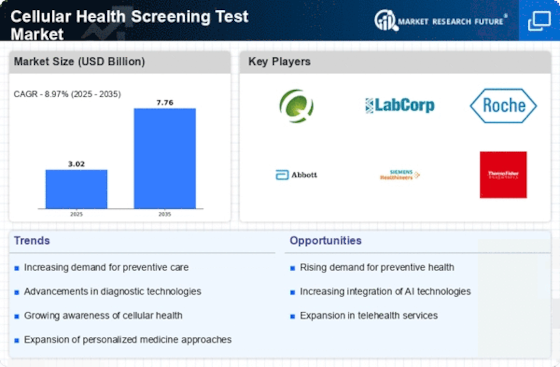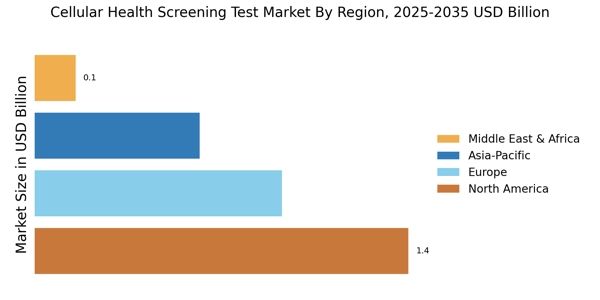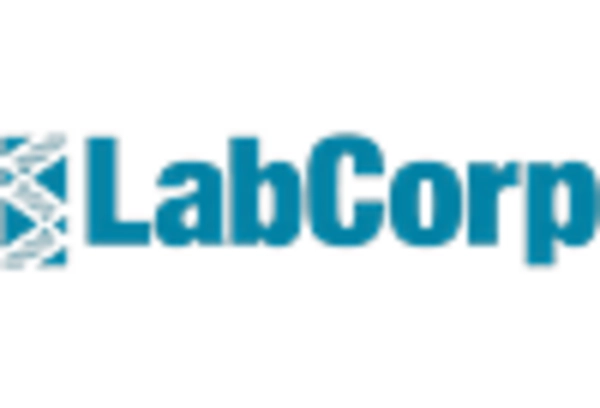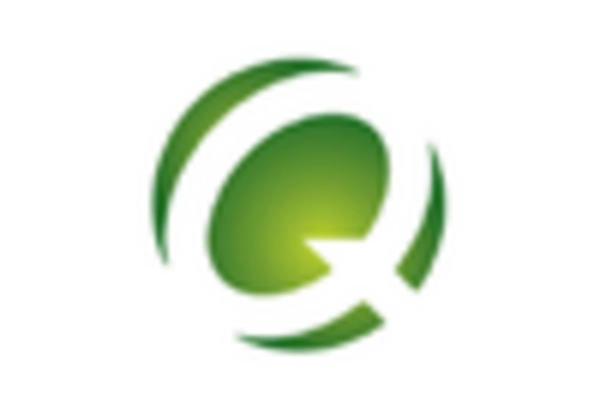Growing Aging Population
The increasing aging population is a critical driver for the Cellular Health Screening Test Market. As the global demographic shifts towards an older population, there is a heightened focus on health management and disease prevention among seniors. Cellular health screening tests are particularly relevant for this demographic, as they can help identify age-related health issues early on. Market projections indicate that the aging population will contribute to a surge in demand for cellular health screenings, with estimates suggesting a growth rate of around 9% in this segment over the next few years. This trend underscores the necessity for effective health monitoring solutions tailored to the needs of older adults.
Government Initiatives and Funding
Government initiatives aimed at promoting health awareness and preventive care are significantly impacting the Cellular Health Screening Test Market. Various health departments are increasingly investing in programs that encourage regular health screenings, including cellular health assessments. These initiatives not only aim to improve public health outcomes but also to reduce long-term healthcare costs associated with chronic diseases. Recent statistics reveal that government funding for preventive health programs has increased by over 15% in the past year, which is likely to enhance the accessibility and affordability of cellular health screening tests. This support is expected to drive market growth as more individuals take advantage of these resources.
Increasing Awareness of Cellular Health
The growing awareness regarding the importance of cellular health is a pivotal driver for the Cellular Health Screening Test Market. As individuals become more informed about the role of cellular health in overall well-being, there is a noticeable shift towards preventive healthcare measures. This trend is reflected in the rising demand for cellular health screening tests, which are perceived as essential tools for early detection of potential health issues. Market data indicates that the cellular health screening segment is projected to witness a compound annual growth rate (CAGR) of approximately 8% over the next five years. This increasing awareness is likely to propel the market forward, as consumers seek proactive solutions to maintain their health and longevity.
Rising Demand for Personalized Medicine
The shift towards personalized medicine is emerging as a significant driver for the Cellular Health Screening Test Market. As healthcare evolves, there is a growing emphasis on tailored treatment plans that cater to individual patient needs. Cellular health screening tests play a crucial role in this paradigm by providing essential insights into a person's unique cellular makeup. This trend is likely to enhance the demand for such tests, as healthcare providers seek to offer more customized care. Market analysis indicates that the personalized medicine sector is expected to grow at a CAGR of approximately 12%, further bolstering the cellular health screening market as practitioners adopt these tests to inform treatment decisions.
Technological Innovations in Testing Methods
Technological advancements are significantly influencing the Cellular Health Screening Test Market. Innovations in testing methodologies, such as the development of non-invasive and highly accurate testing devices, are enhancing the efficiency and reliability of cellular health assessments. For instance, advancements in biomarker identification and analysis techniques are enabling more precise evaluations of cellular function. The market is expected to expand as these technologies become more accessible and affordable. Recent data suggests that the adoption of advanced testing technologies could lead to a market growth rate of around 10% annually, as healthcare providers increasingly integrate these innovations into routine health assessments.

















